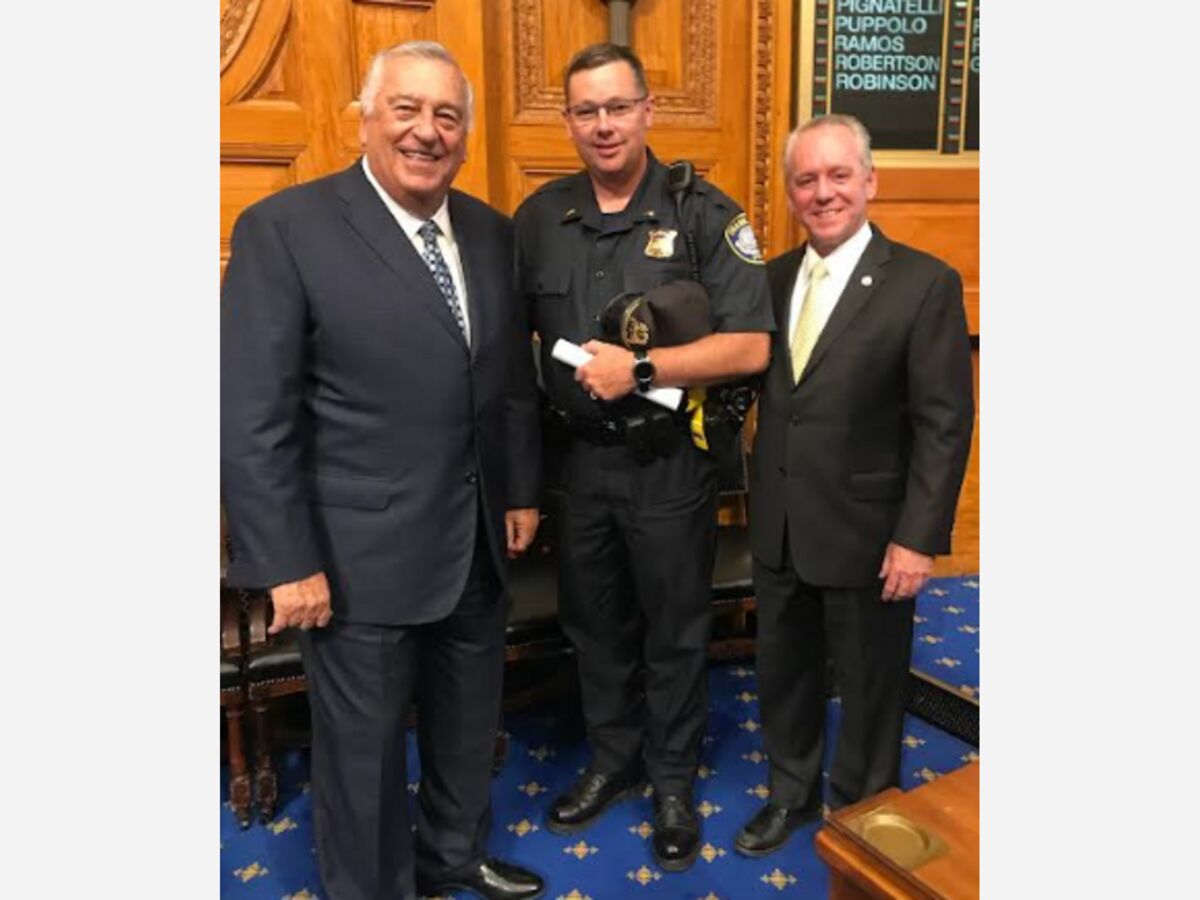Image


Above, House Speaker Ron Mariano and the bill's architects, Franklin Police Lt Jason Reilly and Rep. Jeff Roy.
Thursday, the Massachusetts House of Representatives passed legislation addressing teen sexting and image-based sexual assault, commonly referred to as “revenge porn.”
In testimony on the House floor, Rep Roy stated:
"My introduction to sexting among teens began with a phone call from Franklin Police Officer Jason Reilly. Officer Reilly was the school resource officer in town and he was frustrated by the choices that current law provided to him to address the problem that had arisen in our Franklin community. An incident arose involving illicit images that had circulated on phones and devices involving around 60 students.
"The dilemma Officer Reilly and his fellow law enforcement officers had discovered was that no matter the consequences, whether consensual or not, distributing or possessing nude or partially nude images of someone under 18 years old is considered possession of child pornography, a felony. This is something that is happening throughout the Commonwealth and police officers are reluctant to charge minors with a felony because of the lifelong consequences, and the fact that they would be required to register as sex offenders if convicted.
"To further complicate the matter, according to Massachusetts law, two consenting 17 year olds, for example, can consent and participate in sexual intercourse, but transmitting a nude image of one another would constitute child pornography. Moreover, high and middle school age students do not comprehend the significance of these “sexting” actions or their repercussions. Kids are not always aware that, by sexting, they may be violating child pornography laws, which often carry felony penalties and can require registration as a sex offender.
"As Officer Reilly stated, the intention is not to let more serious or more deserving criminals slip through the cracks of any law already In place. The intention is to provide law enforcement with another option that coincides with a problem a changing society has given us," Roy Said.
“I’m proud the House today passed a bill consistent with our intent during criminal justice reform to provide intervention through diversion instead of incarceration for minors,” said House Speaker Ronald J. Mariano (D-Quincy). “Additionally, the bill criminalizes image-based sexual assault by adults and affords victims of this crime protections, including the opportunity to get a harassment prevention order against their perpetrator.”
“This bill prioritizes survivors of revenge porn by unlocking resources for them while, at the same time, closing a loophole in our criminal harassment statute that will serve to deter and punish those who engage in these horrific acts,” said State Representative and Judiciary Chair Michael S. Day (D-Stoneham). “From providing access to victim witness advocates and direct input on criminal dispositions to enabling survivors to pursue civil remedies against their perpetrators, this approach will empower survivors to reclaim their lives in addition to providing clearly enforceable punitive measures for these crimes.”
“Under current law, when faced with an incident of sexting among teenagers, the police are forced with either charging them with a felony or doing nothing,” said State Representative Jeffrey N. Roy (D-Franklin). “The bill passed today provides law enforcement officers with a middle ground that will allow them to educate kids about the consequences of their actions without ruining their lives. It will have a tremendous impact on people who have become entangled in the web and transmittal of images that can cause traumatic and lifetime harm through a diversion program that will educate them about the legal and personal consequences of “sexting.”
Currently, minors who possess or share explicit photos of themselves or other minors are charged with violating Massachusetts child pornography laws and are required to register with the Sex Offender Registry. “An Act relative to transmitting indecent visual depictions by teens and the unlawful distribution of explicit images” (H.4498) allows minors to be diverted to an educational program established in the bill prior to delinquency proceedings.
The educational diversion program, to be created by the Attorney General and the Department of Elementary and Secondary Education (DESE), would provide teenagers with information about the legal and nonlegal consequences of sexting, which would be made available to school districts. DESE should also encourage districts to implement media literacy programs in their schools as a prevention measure.
A district attorney, however, is allowed to petition the court to bring criminal charges in extreme cases. The bill creates a new misdemeanor offense specifically for minors who possess or disseminate explicit images.
In addition to teen sexting, the bill addresses the nonconsensual distribution of explicit images by adults by establishing a penalty in the existing criminal harassment statute, including prison time and/or a monetary fine for first and subsequent offenses. Under this bill, a victim may also petition the court for a harassment prevention order against a person who has violated this statute.
According to Roy, the bill originated with Lt Jason Reilly from Franklin Police Department and was then filed as formal legislation by Roy. Governor Baker adapted the bill and sent it back to the chamber for further tweaks. " Lt. Reilly was in the chamber with me Thursday and received a standing ovation," added Roy.
“An Act relative to transmitting indecent visual depictions by teens and the unlawful distribution of explicit images” (H.4498) passed the House of Representatives 154-0. It now goes to the Senate for their consideration.